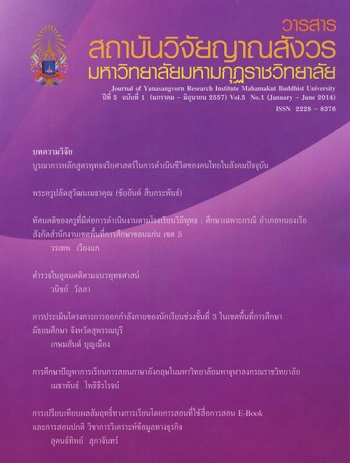Integration of Modern Thais’ Ways of Life with Buddhist Ethics
Main Article Content
Abstract
The objectives of this Dissertation to study the modern Thais’ ways of life, to study the Buddhist ethics to integrate the modern Buddhist ethics, and to present a guidance and establish a new body of knowledge on the pattern of the integration of modern Thais’ ways of life with Buddhist ethics. The research is a qualitative study conducted by studying and analyzing the data collected from the Tipitaka and other relating texts and documents along with the in-depth interviews with 3 monks, 1 novice, 1 nun, and 8 laymen. The information of the study was presented in the descriptive analysis. The findings of this research are as follows:- The ways of life of modern Thais were different from the ancient Thais because of many factors influencing the change in life in society and lifestyles in order to catch up with globalization, technological innovation, and communication. These continuously brought about only material development, not the spiritual development, to Thai people. At the same time, material development caused many moral problems in modern Thais’ ways of life among people in occupational fields. and The Buddhist Ethics for ways of life could be divided into three stages; 1) The fundamental level refers to the five precepts and the five virtues, 2) The intermediate level focuses on the eight precepts and the tenfold wholesome course of action, and 3) The advanced level means the noble eightfold path. The Buddhist Ethics could be integrated into living lives of modern Thais as follows; the fundamental Buddhist ethics could be followed by students, teachers, officials, businessmen and politicians, the intermediate level of Buddhist Ethics could be practiced by nuns and lay devotees, and the advanced level of Buddhist Ethics was suitable for Buddhist monks and novices. The new body of knowledge obtained from the study could be concluded into a “FEE Model”. The “FEE Model” was obtained from the integration of Buddhist ethic principles into the lifestyles of modern Thai people in occupational fields and at least it could relieve problems in living lives or eventually make them disappear.
Article Details
References
คูณ โทขันธ์. พุทธศาสนากับชีวิตประจำวัน. กรุงเทพมหานคร : โรงพิมพ์ โอ.เอส. พริ้นติ้งเฮ้า, 2537.
บุญมี แท่นแก้ว, ผศ., จริยธรรมกับชีวิต. กรุงเทพมหานคร : สำนักพิมพ์ โอเดียนสโตร์, 2552
พระเทวินทร์ เทวินฺโท. พุทธจริยศาสตร์. พิมพ์ครั้งที่ 2. กรุงเทพมหานคร : มปท., 2546.
วศิน อินทสระ. พุทธจริยศาสตร์. กรุงเทพมหานคร : โรงพิมพ์เจริญกิจ, 2529.
วิทย์ วิศทเวทย์ และเสถียรพงษ์ วรรณปก. พระพุทธศาสนากับสังคมไทย. กรุงเทพมหานคร : อักษรเจริญทัศน์, 2529.


